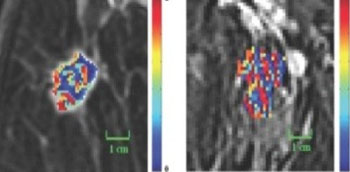Image Analytics to Offer Faster and Less Expensive Guidance for Treatment of Breast Cancer Patients
By MedImaging International staff writers
Posted on 01 Mar 2016
A new technique has been developed that can analyze Magnetic Resonance Image (MRI) data of women with the most common type of breast cancer and reliably differentiate between women who require chemotherapy and those for whom hormonal treatment is sufficient.Posted on 01 Mar 2016
The technique is faster, and cheaper than currently-used genomic testing that differentiates between aggressive and non-aggressive Estrogen Positive-Receptor (ER-positive) cancer in women. The genomic test requires tissue biopsy and analysis, and assigns a risk score to guide treatment. In the past most women underwent chemotherapy, often with harsh side effects.

Image: Differences in dynamic textural patterns can be distinguished between the left image of a woman with a low recurrence score, and the right image of a woman with a high recurrence score (Photo courtesy of Nature Scientific Reports).
The research was carried out by researchers at Case Western Reserve University (CWRU; Cleveland, OH, USA) and was published in the February, 18, 2016, issue of the journal Nature Scientific Reports. The researchers used data mining to search Dynamic Contrast Enhanced MRI image data from 96 ER-positive cancer patients for useful signals to discern aggressive ER-positive from non-aggressive cancer. Dynamic Contrast Enhanced MRI images tissues as they take up a contrast agent. The women also underwent the genomic test. The researchers found that in 85% of the cases, the conclusions from the data mining matched those of the genomic test. The new technique would cost significantly less than the USD 4,000 genomic test, and would requires an MRI scan, instead of a biopsy.
Research leader Anant Madabhushi, biomedical engineering professor, Case Western Reserve, said, “In the United States, nearly 70 percent of all breast cancer patients are diagnosed with ER-positive, but the majority don’t need chemotherapy. We think the dynamic texture data is robust and reliable. It allows us to compare apples to apples. With cloud computing and data warehousing, we can analyze images coming in from anywhere in the world. It breaks down geographic boundaries because everything is electronically transmitted. Even if the MRI test proves to make accurate predictions only for patients at extremely low or extremely high need for chemotherapy, the analysis would still serve 30 to 40 percent of patients.”
Related Links:
Case Western (CWRU)














